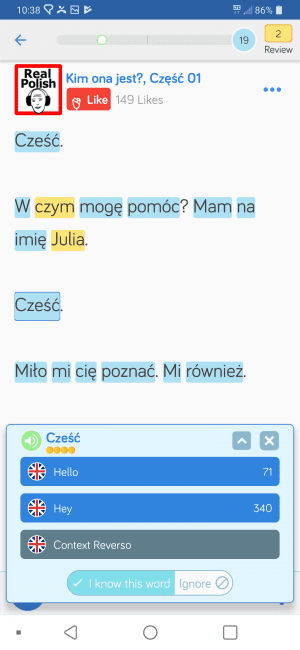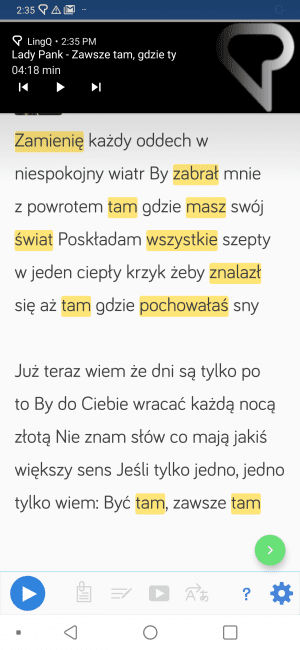Our Quick and Easy-to-Read Guide on the Polish Alphabet
With all the reputation about Polish being one of the most difficult languages to learn, there luckily comes a piece of good news: The Polish alphabet is not entirely different from the English one.
If you are ready to get familiar with a few singularities and to master them in no time, you are on the right track to start your adventure with one of the fastest growing languages in Europe (it’s also the second most spoken language in England).

Basics of the Polish Alphabet
The Polish alphabet is based on the Latin alphabet. Which means that the basic letters are the same ones used in English. However, Polish includes also some letters with diacritical marks.
The total count of letters in the Polish alphabet is 32.There are 9 vowels and 23 consonants and 7 letters among them contain diacritics: the acute accent (ć); the overdot (ż); the tail (ą); or the stroke (ł). What’s more, the letters q, v and x are not counted among Polish letters, as there is no need to use them in Polish wording. They appear only in words of foreign origin.
The table below gathers all the Polish letters with their names, examples and how they sound in English. As you can see, the Polish alphabet isn’t too difficult for native English speakers 😉
| Letter | Polish name | Similar English sound | Example |
| A a | a | like a in large | artysta |
| Ą ą | a; a with tail | nasal o (a bit like o in own) | mąka |
| B b | be | like b in bed | biuro |
| C c | ce | like ts in pits | cyrk |
| Ć ć | cie; ce with accent | like ch in cheap, but a bit softer | mieć |
| D d | de | like d in dog | dom |
| E e | e | like e in bed | pies |
| Ę ę | ę; e with tail | nasal e | pękaty |
| F f | ef | like f in fingers | fortepian |
| G g | gie | like g in go | garnek |
| H h | ha | like h in hammer | hamak |
| I i | i | like ee in meet | ikra |
| J j | jot | like y in yes | jajko |
| K k | ka | like k in king | kot |
| L l | el | like l in light | latarka |
| Ł ł | eł | like w in will | igła |
| M m | em | like m in mother | mama |
| N n | en | like n in not | narty |
| Ń ń | eń; en with accent | like ny in canyon | koń |
| O o | o | like o in long | oko |
| Ó ó | o with accent; ”closed u” | like oo in wood | góra |
| P p | pe | like p in people | portki |
| R r | er | the sound is “trilled” r | rak |
| S s | es | like s in sound | syty |
| Ś ś | eś; es with accent | like sh in sheep, but softer | ślimak |
| T t | te | like t in stop | tata |
| U u | u; “open u” | like oo in wood | ukrop |
| W w | wu | like v in vow | woda |
| Y y | y; igrek | like i in bit (very short) | myjka |
| Z z | zet | like z in zoo | zebra |
| Ź ź | ziet; zet with accent | somewhat like si in vision, but softer | źrebak |
| Ż ż | żet; zet with dot | like si in vision | żebro |
But it’s not over. The Polish alphabet has these formations called “digraphs”. Digraphs are when two letters are used to write one sound. You can think of it like the sh in sheep or fish. There are 7 digraphs used in Polish: ch, cz, dz, dź, dż, rz and sz.
Easy, right?
Oh, and there’s also trigraphs, such as dzi. Like in dziecko or dziki.
Alright, you know the alphabet, but how do the letters sound?
The only way you’ll improve your Polish listening and speaking is by finding good Polish content that you can listen to and read out loud.
That’s where LingQ comes in (available for Android and iOS).

LingQ has thousands of hours of content. Content that you can listen to and read at the same time. The focus here is to provide you with content you love and if you can’t find it in the library, you can import your own.
For example, do you like Polish music? You can import any song into LingQ and create a lesson to follow along the lyrics and read each word’s translation. The great thing about LingQ’s app is that everything is jam-packed into one, and it’s also on mobile which means you can take your music (or podcasts, videos, and so on) on the go.

Take a look out our guide to importing Polish songs into LingQ to find out more. Remember, you can import any content into LingQ as long as you have the transcript (audio is a bonus). That means you can have an infinite number of lessons in your LingQ account to study off of and never get bored.
So what are you waiting for? Start your Polish journey with LingQ and content you enjoy.
***
Agnieszka Meljon is a native speaker of Polish. In addition to English, she has studied German for 12 years. She speaks also basic Spanish and French
